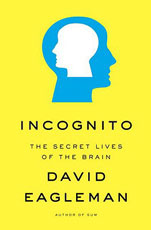David Eagleman is a neuroscientist at Baylor College of Medicine, where he directs the Laboratory for Perception and Action as well as the Initiative on Neuroscience and Law. He is the author of the internationally bestselling book Sum: Forty Tales from the Afterlives, which we chose as one of the Most Spiritually Literate Books of 2009.
In this erudite work, Eagleman shares some of the insights gathered from his scientific research over the years on the brain. Early on, he points out that the conscious mind is not running things: "Most of what we do and think and feel is not under our conscious control." Or to put it another way: "Consciousness is the smallest player in the operations of the brain."
Eagleman demonstrates that vision is a construction of the brain, that minds contain multitudes, that beauty colors our responses to people, and that brains are affected by strokes, tumors, narcotics, or other causes that alter the biology. One example of the latter is some Parkinson's patients where an imbalance of dopamine levels in the brain can trigger excessive gambling, overeating, and heightened sexuality. A slight change in the balance of brain chemistry can cause large changes in behavior, says Eagleman. This fact has implications for our understanding of criminal behavior; perhaps the legal system needs to shift from blame to biology.
Eagleman claims he is not advancing the cause of reductionism but actually expanding neuroscience into areas usually occupied by philosophers. He concludes the book with the following paragraph which justifies what has gone before:
"In the same way that the cosmos is larger than we ever imagined, we ourselves are something greater than we had intuited by introspection. We're now getting the first glimpses of the vastness of inner space. This internal, hidden, intimate cosmos commands its own goals, imperatives, and logic. The brain is an organ that feels alien and outlandish to us, and yet its detailed wiring patterns sculpt the landscape of our inner lives. What a perplexing masterpiece the brain is, and how lucky we are to be in a generation that has the technology and the will to turn our attention to it. It is the most wondrous thing we have discovered in the universe, and it is us."
